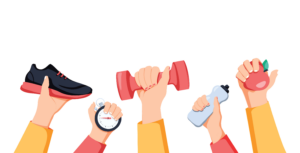3 Main Reasons Why You’re Not Succeeding at Your Sport
Sarah Heckler, MS, RD, LDN, CISSN
As an athlete, your main goal is to perform your best every time you step on the court/field. Athletes ensure this through proper training and coaching. If you’re showing up to practice and listening to your coach but still suffering from poor performance, one thing that could be missing is your nutrition plan. Proper nutrition will not give you magical athletic abilities but it will help you optimize your current skills so that you can perform your best. Here are our top 3 reasons why you may be struggling with poor performance.
-
You are not consuming enough carbohydrates
Carbohydrates are our main source of energy. Think of them as the “gasoline to our car” aka our body. Carbohydrates are especially important for athletes because they not only provide energy but they also optimize glycogen stores and aid in muscle recovery. Glycogen is the stored form of carbohydrate in the muscle. When glycogen stores are full, we have sufficient energy to maintain activity. When stores are depleted, we do not have enough energy to sustain our intensity and performance.
To ensure adequate glycogen stores, carbohydrates must be consumed throughout the day. Including carbohydrates at every meal and snack will ensure adequate glycogen stores. Carbohydrates at meals should come from complex carbohydrates such as:
- Whole grains
- Vegetables
- Beans
Complex carbohydrates are digested slowly and provide us with sustained energy due to their fiber content.. Complex carbohydrates also aid in balancing our blood sugar.
Additionally, having a small pre-workout snack 30 minutes prior to activity will help in conserving glycogen stores for training or endurance events. A pre-workout snack should consist of 30 grams of simple carbohydrates. Simple carbohydrates provide quick, immediate energy. Examples of simple carbohydrates are:
- Fruit – such as Bananas, and fruit juices (such as apple or grape juice)
- Bread or Potatoes
- Pretzels, crackers
- Energy gels, chews
*Carbohydrate needs vary on an individual basis. Speak with your dietitian/sports nutritionist to determine your exact needs.
2. You are dehydrated
As little as a 2% loss in total body water can negatively impact performance.
Exercise creates heat and sweating is our body’s way of cooling itself down. Our body has a fixed amount for how much fluid we can store and an indefinite amount of sweat that can be produced, therefore, if you are not drinking fluids while exercising you will become dehydrated. This is exacerbated in hot and humid environments. Signs and symptoms of dehydration include but are not limited to:
- Headache after training
- Dizziness
- Fatigue
- Nausea
- Cramps
- Poor appetite
- Irritability
- Thirst
- Dark urine
Dehydration can lead to decreased endurance, poor performance, and increased risk of injury. Our muscles are made up of more than 70% water, think of a hydrated muscle as a piece of raw meat. If you try to tear it, it is difficult. Dehydrated muscle is like beef jerky. When you try to tear, it rips easily. Therefore, in order to not only enhance your performance but to also prevent the risk of injury, staying hydrated is a must. For exercise events that are less than 1 hour, water is sufficient to maintain hydration. For events lasting longer than 1 hour or events in hot and humid environments, a sports drink with electrolytes is needed to maintain hydration.
When we sweat we are not only losing fluid but also electrolytes. Electrolytes lost in sweat include sodium, potassium, chloride, magnesium and calcium. Every person has the same electrolytes lost in perspiration; however, we all lose them in different amounts. Electrolytes work together to maintain fluid balance and optimal muscle function. If we are well fueled and hydrated going into an event then we have enough fluid and electrolytes to last about an hour. This is why events that are longer, or when our sweat rate is increased, we need to consume fluid and electrolytes to maintain our fluid balance and muscle function to keep us performing our best.
3. You don’t have a personalized nutrition plan that fuels and hydrates you according to your needs
Each sport has its own training demands and schedule and therefore has its own nutritional needs. Additionally, each person is unique and has their own unique nutritional needs, not only for carbohydrates and fluids but also for protein, energy, micronutrients and fiber. This is why it is important to find the right plan to fit your needs by providing appropriate nourishment, fuel and hydration for your sport, your training schedule, and your food preferences.
We can help!
Schedule a nutrition appointment with dietitian and sports nutritionist, Sarah Heckler, MS, RD, LDN, CISSN to get your personalized nutrition plan. Sarah has years of experience working with athletes from all levels and training backgrounds. She is passionate about helping athletes achieve their full potential through nutrition and has a unique approach that is highly effective in helping athletes understand and support their training needs. These visits are most often covered by your health insurance. Inquire through our website’s contact us page or give our office a call at 919-990-1130 to find out more about benefits available to you.
If you’re not sure you’re ready to commit to nutrition care visits, we’d love for you to join one of our FREE webinar sessions! Click here to register.
We look forward to supporting you to achieve sporting performance goals!!
Yours in health and wellness,
Sarah Heckler, MS, RD, LDN, CISSN
Resources:
Benardot, Dan. Advanced Sports Nutrition. Champaign, Il, Human Kinetics, 2012.
Call Us Today: 919-990-1130






